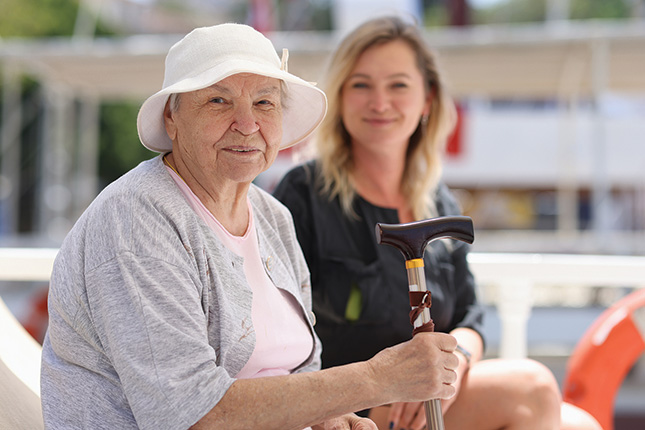Many are aware of workplace protections that mothers and fathers receive. Did you know that caregivers also should have some of those same safeguards? Family caregivers should be protected against negative actions (harassment, dismissal or demotion, failure to promote, and refusal to hire a caregiver) from employers, too.
Nearly 12 percent of the U.S. population — roughly 40 million people — are unpaid caregivers like me to aging adults or adults with disabilities. According to the National Council on Aging and the National Alliance for Caregiving, these caregivers are typically women approaching age 50, like myself, who have teenage children or grandchildren and maintain a job along with other responsibilities while caring for an aging adult.
These women usually care for a relative or spouse for five to 11 years and provide more than 20 hours per week of unpaid labor looking after their loved one. One in six full-time employees are also caregivers, yet not all those in the workplace are understanding or compassionate about the caregiving journey and sometimes engage in discrimination.
Working full time and being a caregiver is challenging. In fact, it’s hard as hell. Even when a schedule is well planned and help is secured, it is still difficult, as the caregiver must manage the schedule, helpers, finances, shopping, etc. And, of course, there is the employment that keeps the lights on — getting your job done, managing your time and staff and fielding concerns and allegations about your work and your caregiving. This can add undue stress to an already taxing and arduous journey.
Prioritizing self-care, communicating with supervisors and staff, keeping an updated calendar, etc. can make it all more manageable. However, what is hard to manage, or even anticipate, is the family caregiving discrimination in the workplace.
WHAT IS FMLA?
The Family Medical Leave Act can offer caregivers employment protections. Not every business must provide FMLA, and not every employee will qualify. For those who are eligible, it provides up to 12 weeks of unpaid leave annually to care for a seriously ill or injured family member, deliver and bond with a new baby, tend to military family needs and heal from a serious illness or injury without losing your job or medical insurance. The definition of family member includes children under 18 years old (or children with a disability who can’t care for themselves), spouses and parents. FMLA also can be taken on an intermittent basis and used over 12 weeks as needed for medical appointments or to tend to your covered loved one. To accomplish this, a request should be made to the employer, who will provide paperwork that should be completed by the loved one’s doctor. The primary physician may be the best person to complete the paperwork rather than the specialty doctor because he or she should be able to provide a holistic assessment of the patient.
Using FMLA is a great option for working caregivers. However, 12 weeks annually may not be enough to effectively care for a loved one who requires close attention for five to 11 years (the typical length of a caregiving journey). FMLA also does not protect spouses like mine who are on this journey too; my husband sometimes takes my parents to their medical appointments or cares for them when I am traveling. Neither does it offer protections for those who care for members of their extended family like grandparents, aunts and uncles, etc.
The protections aren’t perfect, but they can give the caregiver some comfort. Additionally, legislation at the federal and state level is under consideration to protect caregivers from discrimination. This will prove critical, as more and more of us are predicted to live longer and require more caregiving.




One Comment
Leave a Reply